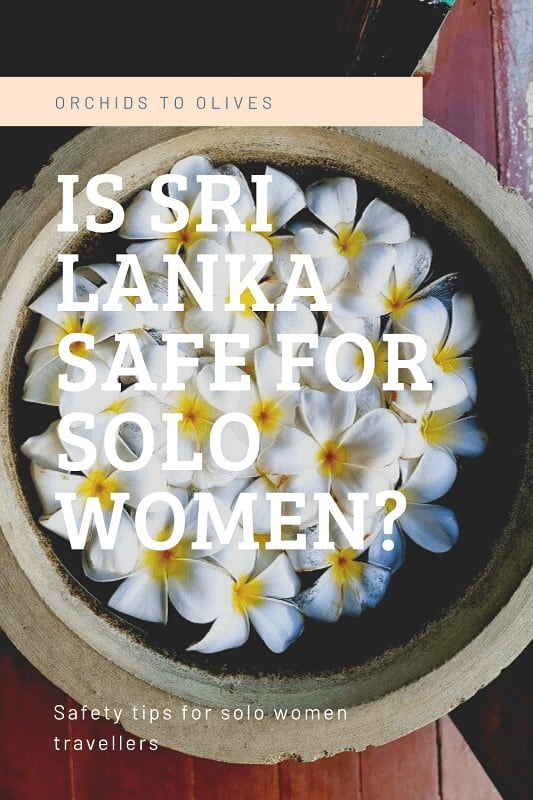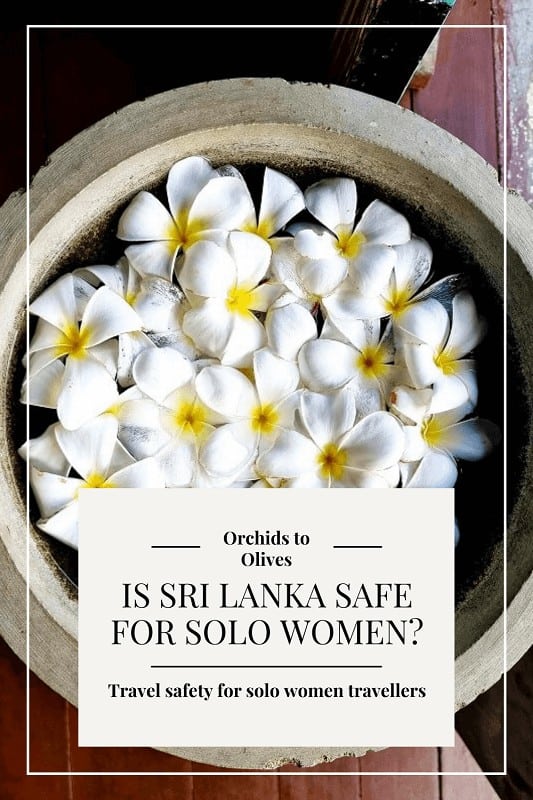Is Sri Lanka safe for solo women travellers?
Solo Women Travellers in Sri Lanka
How to stay safe….
Are you thinking about travelling solo to Sri Lanka?
Great!
Let’s talk safety…
As a solo woman traveller you need to take sensible precautions in any country, to minimise risks to yourself and your belongings, and Sri Lanka is no different.
I’ve visited Sri Lanka four times, twice as a solo woman traveller and overall I’ve experienced unwavering kindness and generosity as a woman alone. I’ve met ample Sri Lankan men and women who have helped me in many different circumstances from getting the right bus, giving me directions to insisting on feeding me huge portions of delicious food!
I’ve rarely felt uncomfortable in Sri Lanka, or that my safety was threatened.
However, just like every country in the world, unscrupulous and unpleasant people exist and so of course you need to take some sensible precautions to stay safe.
Some Facts:
1. There are pockets of men who still lack the basic decorum when dealing with western women, thus you may experience staring and unwanted male attention.
2. Some people live in severe poverty – it’s important to remember that whilst we may be enjoying this beautiful country, others live day to day and lack basic amenities. As solo women travellers we must be aware of how this may define some people’s perception of us as ‘rich’ foreigners.
3. As a volunteer a few years ago, I learnt that alcohol and drug abuse is prevalent in some areas of the community. This severely effects family life, income and behaviour.
4. Many women in Sri Lanka do not travel long distances without a male chaperone, be aware of how your status as a woman travelling solo might be perceived.
5. Scamming exists in many guises.
6. The only times I’ve experienced unscrupulous behaviour in Sri Lanka has been in tourist resorts and Colombo.
How to stay safe as a solo woman traveller in Sri Lanka
Reducing risk
To minimise your risk as a solo woman traveller in Sri Lanka, it’s advisable to take the following sensible precautions:
Note: many of these tips are common sense and apply to many other countries.
Dress appropriately & cover up
As a general rule, cover your legs and shoulders and avoid tight tops.
You already stand out as a woman alone (fact), don’t make yourself a target by wearing skimpy revealing clothes.
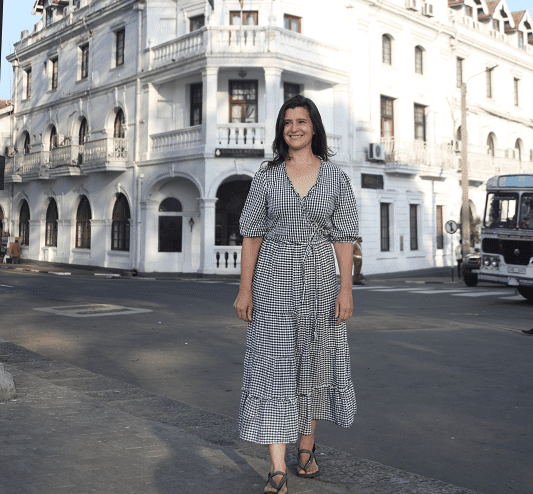
The degree to which this varies, depends on your location. For example, in established tourist areas, you can get away with much more. However, in less touristy locations and certainly when travelling on public transport as a solo woman, it is wise to cover up.
Sarongs and shawls are handy for quick cover.
It’s easy to forget about your shoulders, but this is important. I was once reminded by one of the girls when I was volunteering that I was wearing a strappy top, she tutted at me and said I should cover my shoulders. I was suitably shamed
Book accommodation carefully
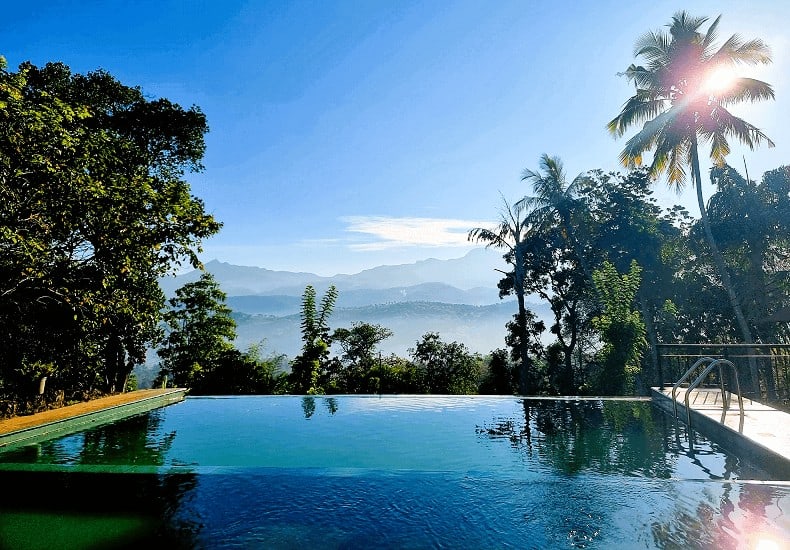
Feeling and knowing you are safe in your accommodation is crucial. Research your accommodation thoroughly and remember that the requirements of a female solo traveller are different to that say of a family. Use sites like Booking.com, TripAdvisor and Airbnb where you can check reviews from previous guests.
Avoid booking a place that doesn’t have a review. Look for comments in relation to safety and solo women reviews. Booking.com allows you to filter by solo traveller.
If you feel unsure about anything, double and triple check.
On my recent trip to Sri Lanka, I booked what I thought was an entire house to myself through Airbnb for a month long trip. On arrival, I discovered that the owner’s son was living in the house as the housekeeper. I felt uncomfortable with this and immediately booked into a hotel and requested a refund from Airbnb on the premise that the advert was unclear. This was a first for me, but it alerted me to the fact the descriptions on Airbnb are not always accurate. This was again confirmed, later in the same month, when I was looking for another Airbnb and I came across one that was again advertised as an entire place, but when I enquired further it was in fact a room in a house.
Check the location of the accommodation before booking to ensure that you will be in a safe neighbourhood. Again, what might be appropriate for a family might not be suitable for a solo woman. The idea of an eco cabin in the jungle might sound lovely, but probably not the safest option on your own.
If you plan to go out at night, book a central location so that you don’t need to worry about finding transport to get back.
Plan night time activities
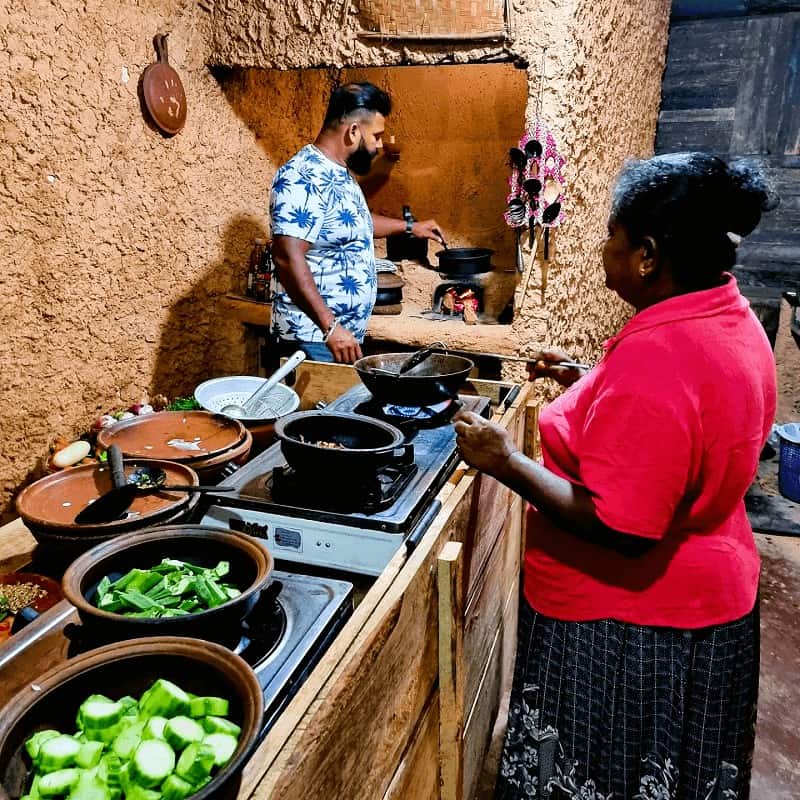
Evenings can seem like the trickiest part of the day as a female solo traveller. It can be difficult watching groups of friends or couples enjoying a meal and drinks together and you may feel unsafe wandering the streets by yourself.
However, it doesn’t need to be difficult, you can turn the evenings into the time of day where you do a planned activity.
Check out Airbnb Experiences or Meetup for local evening activities. For example, you could go on a guided evening walk, attend a cookery class, enjoy local entertainment, or join an organised meal. It’s a great way to fill your evenings with cool stuff and chat to new people.
On a recent trip to Sri Lanka, I went to an organised cookery class with three other guests. It began at 4 pm with a tour around the market to buy produce for the meal, followed by 2 hours of cooking, followed by the reward of eating! It was a great way to share a meal. The transport home was arranged by the host and I felt safe at all times.
Night draws in quickly
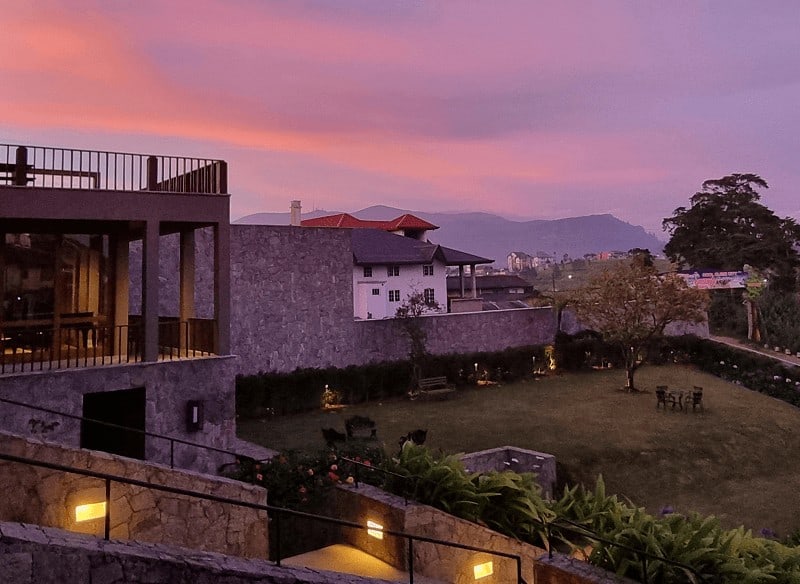
Night time draws in early in the tropics and it becomes very dark quickly, especially when street lighting is poor.
If your accommodation is not situated centrally, plan to either get back before dark, travel back in a group or book a tuk tuk driver you are familiar with – usually your hotel will have their own or be able to recommend one.
Personal nervous moments in Sri Lanka…don’t do what I did!
I’ve had a few nervous moments and one in particular stands out!
I arrived in Negombo the night before my return flight home and I had stupidly not looked on the map at where my VERY cheap guest house was located. It was already dark when I arrived on the outskirts of Negombo, so I quickly found myself a tuk-tuk to take me to my accommodation.
The journey was only about 10 minutes, but seemed much longer and entailed winding along pitch black country lanes to a dingy rundown guest house. I felt very vulnerable throughout the ride and whilst the driver was pleasant enough, I was quite scared and very annoyed with myself for not taking more care.
The guest house itself was another matter entirely – dirty, mosquito ridden with a wobbly lock on the door. Outside stinking piles of burning rubbish could be seen from my window with bellowing smoke drifting through the dark night air. I barely slept that night and suffice to say this was not the best last evening I’ve spent in Sri Lanka!
In the morning things didn’t look quite so bad, the countryside looked far more welcoming and the owner of the guest house were fine, but still – lesson learnt – always check out accommodation and its location carefully!
Stay safe hiking
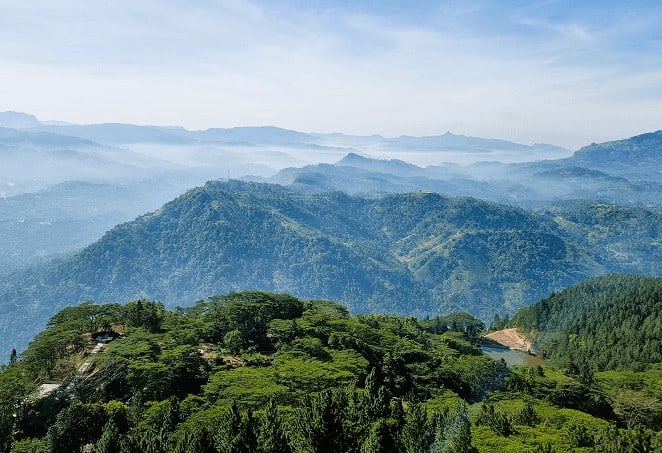
Sri Lanka has some magnificent countryside and there’s an abundance of hiking opportunities.
How to stay safe hiking:
* if you plan to hike alone, only choose well trodden routes where you know you will be walking with other people e.g. Little Adams Peak in Ella.
* Book a guide for any hikes to remote areas e.g. Knuckles Mountain Range. Don’t take the risk of going alone. It’s not worth it.
* Use sites such as Airbnb Experiences, Viator and Get Your Guide. Check reviews carefully and only book if there are other people booked onto the same hike.
Historic Sites
Don’t presume historic sites will be busy – depending on the time of year and time of day – it could be relatively quiet.
Don’t make yourself a target.
Book an organised group guide through a sites such as Airbnb Experiences, Viator and Get Your Guide.
Never trust someone that stops you on the street and says they are a guide.
Buses & trains
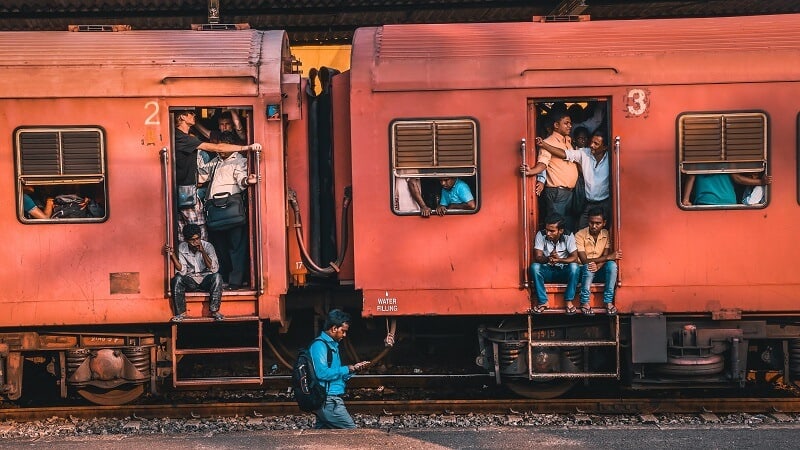
Travelling by bus and train in Sri Lanka is an awesome experience. It’s very cheap, regular and buses in particular go everywhere.
However, without a doubt it’s impossible to not get super squeezed up close and personal to someone at some point! It’s just the way it is.
Yes, it can be a bit uncomfortable and yes it can get very hot, but this is Sri Lanka! Enjoy the experience.
Tips for staying safe on a bus or train journey:
* Try to sit with women and families. If you can’t and you sense that the man next to you is taking advantage of his position or he is closer than he needs to be, move if you can, or give him a hard stare of disapproval and if that doesn’t work tell him ‘no’ – you wouldn’t accept this in your own country, so don’t accept it here.
Most men respond to a curt hard stare and stop. I had an unpleasant experience of a man in the seat behind me, poking his fingers through the gap and trying to feel my bottom. I turned around abruptly and glared at him, as did the man sat next to me and several people surrounding him. That stopped him!
* Dress – remember to be culturally appropriate in the way you dress. Shawls and sarongs are great quick cover ups, but for longer journeys I’d recommend long sleeved shirts, maxi skirts or loose fitting trouser.
* Avoid travelling at night alone and if you have to, try to arrange to travel with other people.
* Wear a fake wedding ring?? – I’ve seen this advice given in lots of guidebooks, but I’m not entirely sure if it works as a means of avoiding unwanted attention. I think if a man is intent on looking and pestering, they’re not particularly put off by a wedding ring. Far better to just have your wits about you and don’t take unnecessary risks.
* Trains – try to reserve a seat in advance. Depending on the train and where it’s going, there are different classes. For example on the Ella – Kandy – Colombo train, there’s first, second and third. You can reserve seats for both first and second. If you do not reserve a seat, you must go in the second class unreserved carriage (or third), which is generally a squash fest and you could end up standing much of the way. This is highly frustrating if there are free seats in the reserved carriage, so avoid the palaver and reserve in advance.
Note: you can’t reserve for all trains and you can only reserve a few days in advance by going to the train station.
Tuk-tuk safety & scams
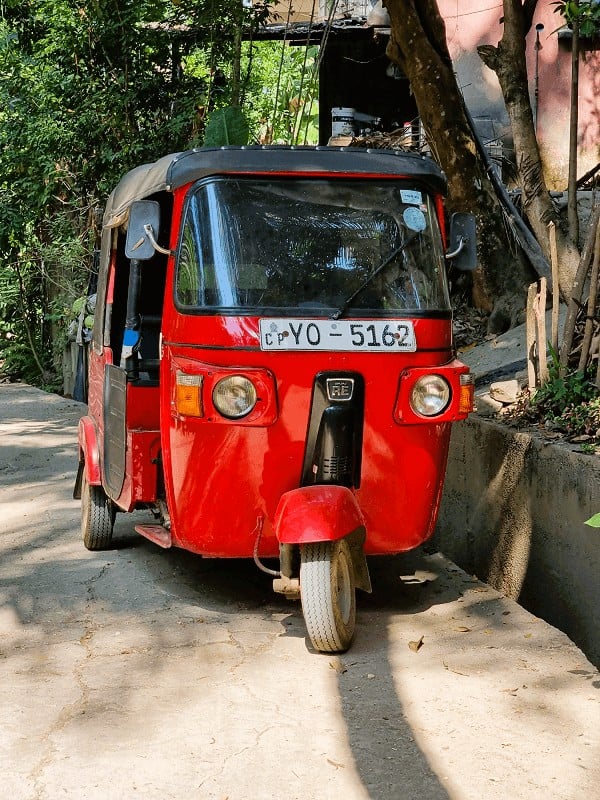
You can’t really go to Sri Lanka without getting in a tuk-tuk. They’re everywhere and they are a fantastic way to get around, but you also need to be mindful of staying safe and avoiding scams.
Tuk-tuks are three-wheeled open air carriages attached to a motorbike chassis. Tuk-tuks can carry two average sized people, but it’s common to see an entire family squeezed inside!
Tuk-tuk Safety
* Keep your bags close, and don’t allow any straps to dangle. Thieves on motorcycles can snatch bags from moving tuk-tuks then speed away.
* be prepared to breathe in car fumes.
* agree the price before you get into the tuk-tuk and always barter. Be aware that there’s a local price and a tourist price, so don’t be afraid to try and get the local price.
* some tuk-tuks have meters, though these are few and far between, if you see one jump in!
* avoid hailing a tuk-tuk at night, you don’t who you are getting a ride with. If you need a ride home at night, either pre-book a reliable tuk-tuk driver that your accommodation should be able to recommend. Alternatively, book an Uber, your details are tracked and it’s much safer.
* check that the seat is screwed in place – I had an unfortunate experience. The tuk-tuk driver didn’t see a pot hole in the road, the vehicle jumped abruptly and my seat that was not screwed in slid with me on it into the metal rail in front, really hurting my knees.
Classic tuk-tuk scams
I’ve experienced all of these:
* drivers claiming the meter has broken
* drivers claiming they misunderstand the location stated, driving miles out, and then charging you for the privilege.
This happen to me in Colombo. I wanted to go to Cinnamon Gardens, a very well known park in the centre of Colombo and only 5 minutes from my starting point. I told the driver and he repeated the name and started driving. 10 minutes later, realising that I was going in the opposite direction of where I wanted to go, I told him to stop. I said again, Cinnamon Gardens, I showed him on my map and he said yes and did a back turn in another direction, not the direction I needed to go. I stopped him again, he got out and asked another tuk-tuk driver for the very well known location, who claimed he also didn’t know it and wanted my phone to check google maps, at which point I got out the tuk-tuk and said I wanted to finish the journey. I walked to a nearby shop, where some women were standing and got into another tuk-tuk who to took me straight to Cinnamon Gardens.
* massively over charging – without a doubt this happens everywhere, tourists are rarely charged the local rate. When you are charged the local rate, you realise how much you’ve previously been overcharged. Whilst I don’t mind paying a few rupees more, I begrudge being ripped off. I found tuk-tuk drivers in the tourist areas along the south coast were more likely to do this than anywhere else. Always barter the price.
* claiming your hotel is closed – a common scam is for drivers to inform you that your booked hotel is closed and offer to take you to another hotel.
This happened to me in Nuwara Eliya, I arrived at the train station asked the tuk-tuk driver to take me to my hotel. He asked for the hotel telephone number so he could check the location, rang them and then informed me it was closed and he could take me to another hotel. At which point I laughed, walked around the corner and found another driver.
General Scam Awareness
As well as tuk-tuk scams, it’s an unfortunate reality that tourists are easy targets in terms of being scammed so it’s really useful to be aware of them so that you can try and avoid them. Research them on the internet before you go. There are many wild and ingenious ways scammers will try and get hold of your money, from fake ATMS to children requesting money for expensive milk powder.
General Solo Women Travel Safety
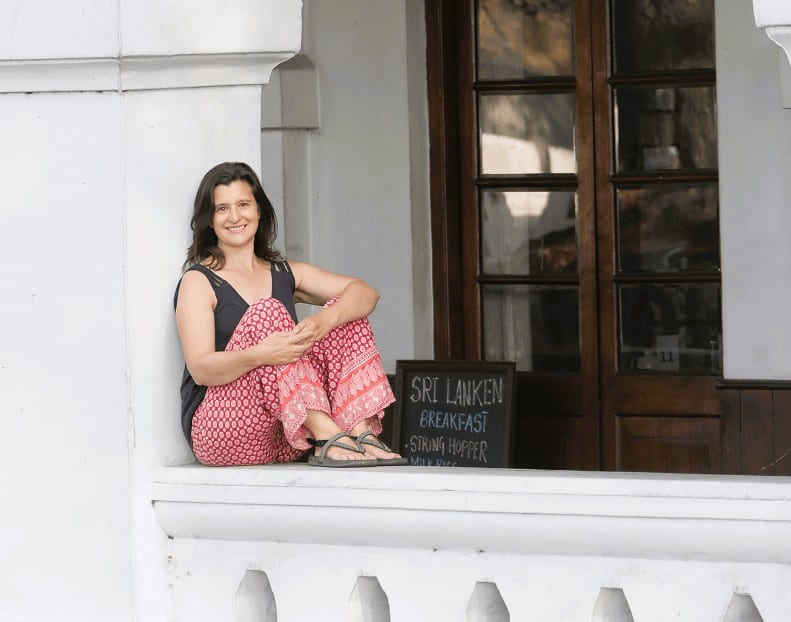
Choose your smiles carefully
We all want to come across as friendly, but be aware that smiling, making eye contact and being polite to people, particularly men, can bring unwanted attention.
If people are soliciting you, don’t acknowledge them. Sure, it feels rude, but even a ‘no thank you’ can be regarded as a sign that you understood and so they’ll just keep trying. If it feels rude, remind yourself that actually they are being very rude by pestering you.
Keep your eyes forward, shoulders back and head up and walk purposefully.
Don’t look lost
Try not to look lost, it makes you an easy target. Admittedly, this is easier said than done when you’ve just arrived somewhere new! However, if you check out your route in advance and know some key landmarks this will make you look more confident. If you start to feel lost, avoid standing on a street corner with your phone out peering at Google maps, instead find somewhere where you are less conspicuous such as a café or a hotel.
If it’s night-time, it goes without saying that you need to be extra careful or ideally have pre-booked transport.
Be aware of your surroundings
As a solo woman traveller, you need to be aware of your surroundings and any people that might be targeting you. If you usually listen to music whilst walking, I’d probably avoid doing so in a foreign location so that you can hear what’s going on around you.
Useful questions to ask yourself:
Is someone walking too close to me?
Has anyone been walking behind or next to me for several minutes?
Is a car/moped slowing down near unnecessarily?
Don’t be paranoid but do be conscious of your surroundings. Pay attention to your intuition, if something doesn’t feel right, best to remove yourself rather that test whether you were right.
If in doubt, pop into a shop or a café for a few minutes until you feel confident the person or vehicle has moved on.
Money & Valuables
It sounds obvious but never flaunt large amounts of money.
Get a money belt or a cross bag. Avoid bags that you just hang from your shoulder, they are easy to swipe by someone nipping by on a scooter.
Don’t have money in your pockets (I think men tend to do this more than women).
Don’t carry more cash than you need. I tend to take out enough for a couple of days at the most.
Don’t keep all your valuables in one place. Have cards or cash in different bags so that if you lose one, you know you have a back-up.
Don’t wear expensive jewellery and keep valuables hidden.
Mobile Phone
Keep your mobile phone hidden.
We’re all very used to having our mobile phones out, using google maps to find a location, texting, chatting whilst we wander but remember, depending on where you are a decent smartphone could be worth a month’s rent for some people in the world.
Don’t make yourself a target. If you need to look at your phone, step inside a shop or go and have chill out in a café.
I sometimes use an old phone out in public and keep my expensive smartphone for indoors.
Don’t post on social media until you’ve left
If you plan to share travel photos on social media, avoid sharing whilst you are still at the location, it can put you at risk. Yes, of course you want to Instagram the fabulous hotel you’re staying in but wait until after you’ve left and then make everyone jealous.
Also be mindful of broadcasting your location. If you check in somewhere or have you location services enabled on your mobile, you’re trackable.
Pin it…save it for later
